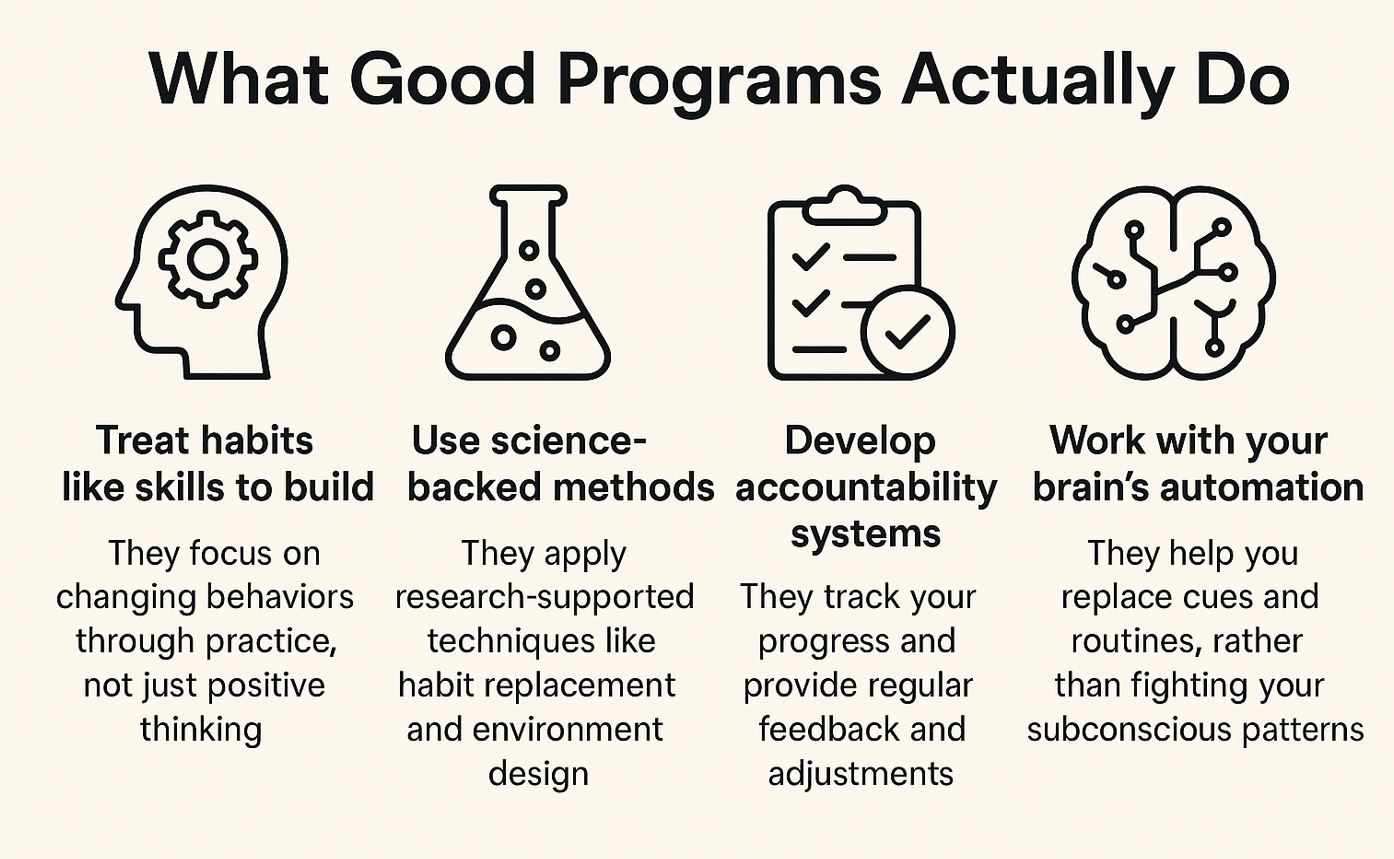7 Best Coaching Programs to Stop Unhealthy Habits: Your Complete Guide

7 Best Coaching Programs to Stop Unhealthy Habits: Your Complete Guide
A friend spent $4,800 on habit coaching last year. She worked with two different coaches. Bought every course they recommended. Downloaded their apps and workbooks.
By November, she was doing exactly the same things she promised to stop in January.
Then she found one program that helped her stop unhealthy habits completely. Not because it cost more money or had better marketing. But because it actually understood how real change happens.
Most coaching programs focus on motivation and willpower. The ones that work focus on systems and brain science instead.
Here’s what separates programs that waste your time from programs that help you stop unhealthy habits for good.
Why Most Programs Fail to Help You Stop Unhealthy Habits
 The coaching industry is jam packed with well-meaning people who don’t understand how behavior change actually works. They use outdated methods that sound inspiring but fail when life gets difficult.
The coaching industry is jam packed with well-meaning people who don’t understand how behavior change actually works. They use outdated methods that sound inspiring but fail when life gets difficult.
Most coaches still believe willpower is the solution. They think if they can motivate you enough, you’ll magically develop the strength to stop unhealthy habits through pure determination. This approach fails because willpower is limited and unreliable.
Science shows that successful change comes from changing your environment, not changing your mindset. The best programs to stop unhealthy habits understand this crucial difference.
Another major problem is the one-size-fits-all approach. Many programs use identical methods for everyone. But in reality, your habits formed for specific reasons related to your particular life, stress, and circumstances.
The worst programs are expensive cheerleading sessions. You pay thousands of dollars for someone to tell you “you can do this” without teaching you actual skills to stop unhealthy habits when triggers hit.
I learned this lesson painfully. My first habit coach was enthusiastic and motivating. But after three months, I had no concrete tools for handling stress without falling back into old patterns.
Programs that work treat stopping unhealthy habits like a skill to learn, not a motivation problem to solve with positive thinking.
What Science Reveals About Stopping Unhealthy Habits
Your brain creates habits to save mental energy. When you repeat behaviors often enough, they become automatic responses that happen without conscious thought. This system works great for things like brushing teeth or tying your shoelaces.
It works against you when it comes to stress eating, endless scrolling, or other patterns you want to change. Effective coaching programs work with your brain’s natural systems instead of fighting them.
The best programs use proven methods from psychology research, techniques like habit replacement, environment design, and trigger management. These approaches have been tested in scientific studies, not just motivational seminars.
They also understand that lasting change takes time and patience. Your brain needs weeks or months to rewire automatic patterns that have been active for years. Programs promising instant results are usually lying or using unsustainable methods.
Accountability plays a crucial role too. Research shows that people who report their progress to someone else are significantly more likely to stop unhealthy habits successfully.
Good accountability includes specific tracking, honest feedback, and adjustment strategies when approaches aren’t working. It’s professional coaching, not just cheerleading or moral support.
The awareness component is essential as well. Many unhealthy habits happen unconsciously when you’re stressed, bored, or overwhelmed. You can’t change patterns you don’t notice happening in real time.
7 Top-Rated Programs That Help You Stop Unhealthy Habits
After researching dozens of programs, these seven consistently produce lasting results. They use science-based methods and have proven track records of helping people stop unhealthy habits permanently.
1. Noom Psychology-Based Coaching
 Noom combines app-based tracking with real human coaches trained in psychology. Their approach is built on cognitive behavioral therapy principles, not just motivation and inspiration.
Noom combines app-based tracking with real human coaches trained in psychology. Their approach is built on cognitive behavioral therapy principles, not just motivation and inspiration.
What makes it effective: Daily check-ins, personalized lessons, and coaches who understand the mental patterns behind your habits. They focus on changing thought patterns that drive behavior instead of just willpower.
Best for: People who like data tracking and want to understand the psychological side of their patterns.
Investment: $59-199 per month depending on program length. More affordable than most individual coaching while still providing personal support.
2. BetterHelp Habit-Focused Therapy
While technically therapy, many BetterHelp providers specialize in helping people stop habits. You get matched with licensed professionals who understand behavior modification and psychology.
What makes it effective: Professional training in evidence-based approaches, flexible scheduling options, and therapists who use techniques specifically designed to stop unhealthy habits at their root causes.
Best for: People whose habits connect to deeper emotional issues like anxiety, depression, or trauma. Also good if you prefer text-based communication over phone calls.
Investment: $60-90 per week for sessions. Often covered by insurance, making it more affordable than traditional coaching while providing professional expertise.
3. Precision Nutrition Coaching
Originally designed for nutrition habits, their methods work effectively to stop unhealthy habits in any area. They use a gradual approach that builds on small wins rather than dramatic changes.
What makes it effective: They start incredibly small and build momentum slowly over time. Their coaches are trained in behavior psychology, not just nutrition science or fitness motivation.
Best for: People who’ve failed with extreme approaches and need a gentler method to stop unhealthy habits. Excellent for stress-related eating, emotional patterns, and lifestyle changes.
Investment: $1,000-2,000 for comprehensive 12-month programs. More expensive but includes ongoing support and systematic approach to lasting change.
4. Mindful Schools Habit Transformation
This program combines mindfulness training with practical tools. They focus on awareness-based approaches to breaking automatic patterns that happen unconsciously.
What makes it effective: Strong emphasis on understanding your triggers and emotional patterns before trying to change them. Uses meditation and mindfulness as practical tools, not just relaxation techniques.
Best for: People whose habits are triggered by stress, anxiety, or emotional overwhelm. Good for those interested in mindfulness approaches to stop unhealthy habits naturally.
Investment: $500-1,500 for group programs, $200-300 per month for individual coaching with personalized attention and support.
5. Atomic Habits Coaching Network
Based on James Clear’s bestselling book, this network includes coaches trained in his specific methodology to stop bad habits. They focus on tiny changes that compound over time into major transformations.
What makes it effective: Systematic approach to environment design and habit replacement. Coaches are certified in specific techniques that have been proven effective in research and real-world application.
Best for: People who like systematic, step-by-step approaches. Good for productivity patterns, daily routines, and lifestyle changes that need structure.
Investment: $150-400 per month depending on coach experience and program structure. Mid-range pricing with proven methodology backing the approach.
6. Tiny Habits Academy
Created by Stanford behavior scientist BJ Fogg, this program teaches his research-based method to stop unhealthy habits. You start with changes so small they’re almost impossible to fail at completing.
What makes it effective: Based on decades of research at Stanford University. The approach removes friction and builds confidence through immediate wins rather than overwhelming changes.
Best for: People who’ve struggled with perfectionism or all-or-nothing thinking. Excellent for building replacement habits while you stop unhealthy habits gradually and sustainably.
Investment: $300-800 for group programs, $1,500-3,000 for individual coaching. Higher-end pricing but backed by university research and proven results.
7. Habit Nest Coaching Programs
They offer both self-guided journals and coached programs. Their approach combines tracking systems with specific frameworks for lasting behavior change.
What makes it effective: Simple tracking systems combined with coach support when you need guidance. Good balance of structure and flexibility to accommodate different learning styles.
Best for: People who like physical tracking but want coach support available when challenges arise. Good for working to stop unhealthy habits in multiple areas simultaneously.
Investment: $50-200 for guided programs, $500-1,000 for coached versions. Most affordable option while still providing professional guidance and support.
How to Choose the Right Program to Stop Unhealthy Habits
The best coaching program depends on your specific patterns, learning style, and budget. Here’s how to choose wisely for your situation and goals.
Consider your habit type carefully. Some programs work better for certain behaviors. Noom excels with eating and health habits. Atomic Habits works well for productivity and routine patterns. Mindful Schools handles stress-related behaviors effectively.
Think about your personality and preferences. Do you prefer structure or flexibility? High-touch support or more independence? Data tracking or intuitive approaches? Match the program style to how you naturally learn.
Evaluate your budget realistically for long-term success. Effective coaching requires investment, but expensive doesn’t always mean better results. Some $100/month programs deliver better outcomes than $500/month alternatives.
Check their success metrics and testimonials. Good programs track specific outcomes, not just satisfaction scores. Look for concrete data on how many people complete the program and successfully stop unhealthy habits long-term.
Ask about their specific methods and approach. Effective programs can clearly explain their methodology and why it works to stop unhealthy habits. Be suspicious of vague descriptions or airy-fairy sounding processes.
Consider the realistic time commitment required. Real change takes months, not weeks to become permanent. Programs promising to help you stop unhealthy habits in just days usually deliver temporary results. Changing habits is not a quick fix.
Evaluate ongoing support after the program ends. What happens when formal coaching finishes? The best programs provide tools and resources for maintaining changes independently without ongoing support.
I recommend starting with a shorter, less expensive program to test their approach. If it works well to stop unhealthy habits, you can always invest in more comprehensive coaching later.
Red Flags: Programs to Avoid Completely
Not all coaching programs are worth your investment. Here are warning signs that indicate you should look elsewhere to stop unhealthy habits effectively.
They guarantee specific results within unrealistic timeframes. Real behavior change depends on many factors beyond the coach’s control. Honest programs focus on providing tools and support, not guaranteeing outcomes.
They use high-pressure sales tactics or urgency. Good programs don’t need to rush your decision. Be wary of limited-time offers or pressure to sign up immediately.
They focus only on motivation and inspiration. While encouragement helps, it’s not enough for lasting change. Look for programs that teach specific skills and techniques to stop unhealthy habits systematically.
They promise instant transformation or overnight change. Changing ingrained patterns takes time and patience. Programs claiming you’ll stop unhealthy habits completely in days or weeks are usually unrealistic.
They have no relevant credentials or professional training. Effective coaching requires understanding psychology and behavior science. Avoid coaches with no relevant education or certification in behavior change.
They use shame-based approaches or guilt tactics. Good coaching is supportive and understanding. Programs that blame you for past failures or use guilt as motivation often backfire completely.
They avoid discussing setbacks or challenges. Real change involves ups and downs. Programs that don’t prepare you for difficulties or provide comeback strategies are setting you up for failure.
I once tried a program that promised to help me stop unhealthy habits in 14 days using “revolutionary” techniques. It used shame-based language and unrealistic expectations that made me feel worse about myself.
What to Expect During Your Journey to Stop Unhealthy Habits
 Understanding the typical progression helps set realistic expectations and increases your chances of success with any program you choose.
Understanding the typical progression helps set realistic expectations and increases your chances of success with any program you choose.
Weeks 1-2: Assessment and Planning Phase Your coach will understand your current patterns, triggers, and goals. This involves understanding your habits and environment. Good programs don’t rush this crucial foundation phase.
Weeks 3-8: Foundation Building and Skill Development You’ll learn basic techniques and start implementing small changes. Progress might feel slow, but you’re building skills that support bigger changes to stop unhealthy habits later.
Weeks 9-16: Momentum Building and Pattern Refinement As new behaviors become more automatic, you’ll tackle more challenging aspects of change. Your coach will adjust strategies based on what’s working effectively.
Weeks 17-24: Integration and Long-term Independence The focus shifts to maintaining changes without constant support. You’ll develop skills for handling future challenges and continuing independently.
Expect setbacks during this process completely. They’re normal and expected, not signs of failure or weakness. Good coaches prepare you for these challenges and help you recover quickly.
You might feel frustrated or uncomfortable at times. Change can be difficult, even when it’s positive and necessary. This is especially true when you’re giving up habits that provided comfort or stress relief.
But most people are surprised by how much other areas improve simultaneously. Better sleep leads to improved mood and energy. Less stress eating improves physical health. The positive changes often compound beyond what you originally targeted.
Making the Most of Your Investment
Coaching programs work best when you’re actively engaged, not passively waiting for change to happen, not waiting for someone to fix you. Here’s how to maximize your results and investment.
Be completely honest with your coach about everything. They can only help with accurate information you provide. Don’t minimize your struggles or exaggerate your progress.
Do the assigned work between sessions consistently. Coaching isn’t magic that happens during calls. The real change occurs in your daily life through practice and application of new skills.
Track your progress using whatever method works best. Whether it’s an app, journal, or simple calendar marks, monitoring your behavior helps you and your coach see patterns and adjust approaches.
Ask questions immediately when you’re confused about anything. Good coaches welcome questions and clarification requests. Don’t nod along if you don’t understand instructions.
Communicate honestly when strategies aren’t working effectively. Your coach can only adjust approaches if they know what’s not producing results. Speak up if methods feel too difficult or aren’t helping.
Prepare for sessions in advance with specific examples. Think about what happened since your last meeting. What worked well? What was challenging? Come with concrete situations to discuss and analyze.
Set realistic expectations for the timeline and process. Change takes time and consistent effort. Don’t expect linear progress or perfect execution. Focus on overall trends rather than daily fluctuations.
Remember that coaching is a collaborative partnership. Your coach provides expertise and accountability, but you do the actual work to stop those habits permanently through daily choices.
Conclusion
The right coaching program can help you stop unhealthy habits that you’ve struggled with for months or years. But success depends on choosing programs that use proven methods, not just inspirational speaking.
Look for coaches who understand the science of behavior change completely. Programs that focus on environment design and practical skills development. Systems that provide ongoing accountability and strategy adjustment when needed.
Most importantly, choose a program that matches your learning style and specific habits. The most effective approach is the one you’ll actually follow consistently over time.
Try this today: pick one habit you want to stop and research which type of program might work best for that specific behavior. Don’t choose based only on price or popularity.
Investing in effective coaching isn’t an expense. It’s an investment in skills you’ll use for the rest of your life to stop bad habits permanently.
Your patterns don’t define who you are. They’re just behaviors you learned for specific reasons. With the right guidance and consistent effort, you can stop unhealthy habits and create the life you actually want.
Which type of coaching program sounds most helpful for your situation? What habit would you most like professional support to stop completely?
The Hidden Pain Behind Toxic Traits: Where They Come From (Part 2)






